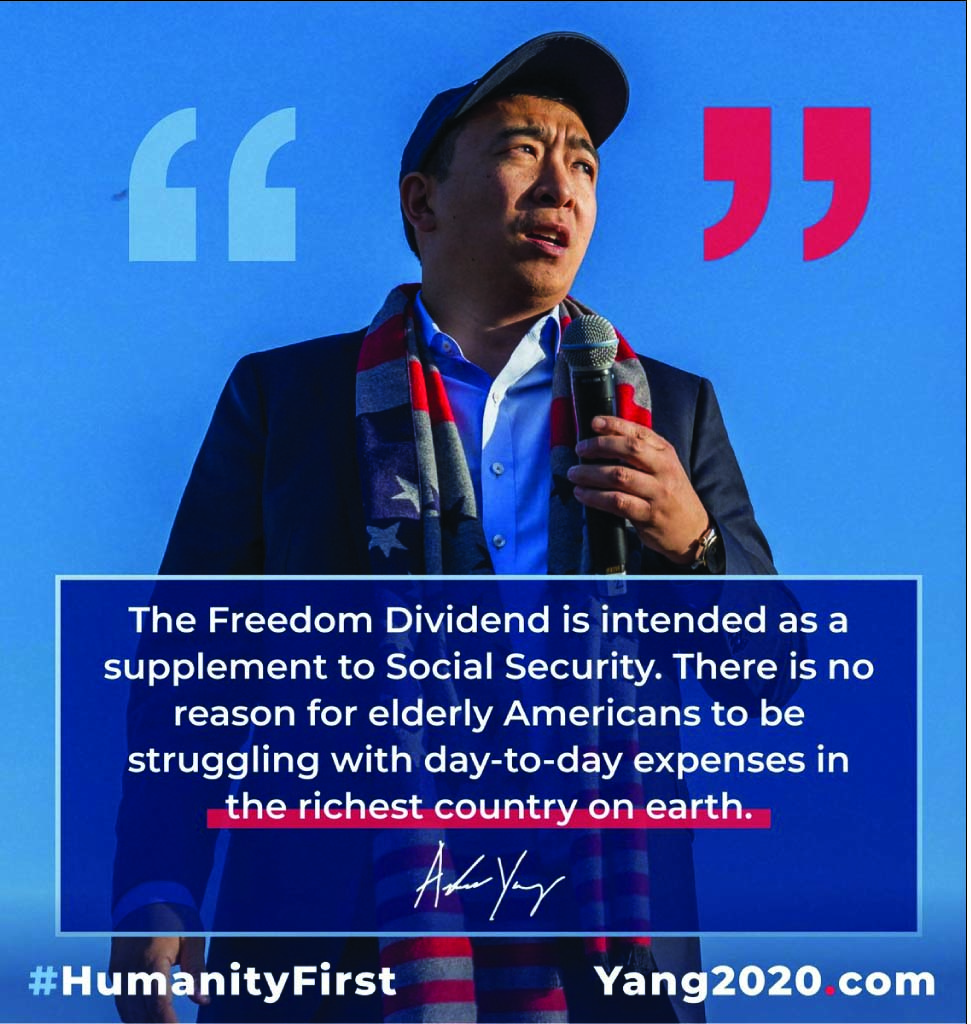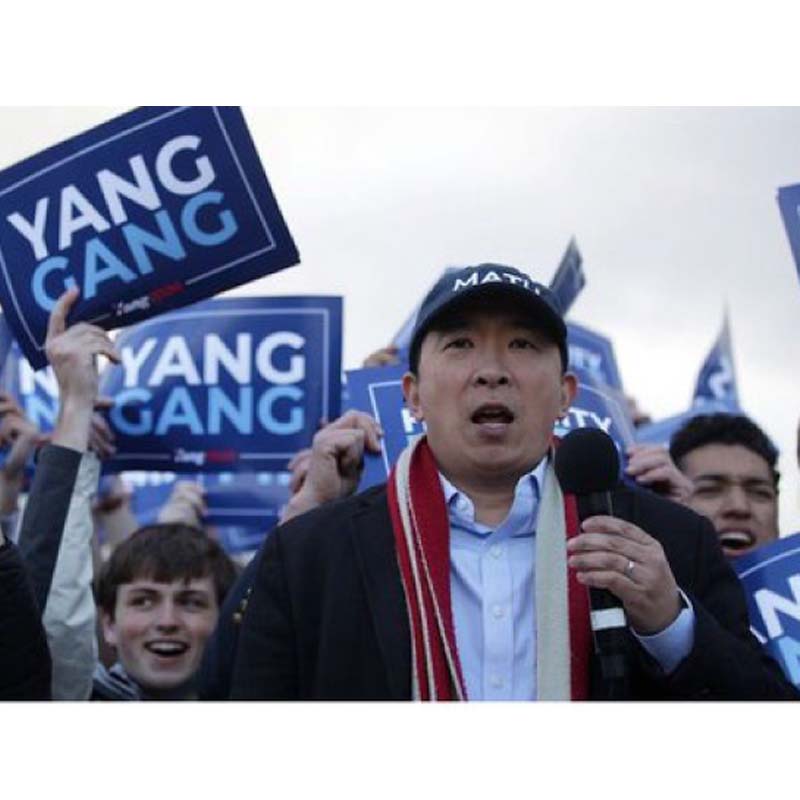Barack Obama did it first. He became the first US president from an ethnic minority. Now, Andrew Yang, a Chinese-American, is following suit, aspiring for the White House. While his chances are slim, he is inspiring thousands of young Asian-Americans with this impossible quest. Will Yang’s story also inspire a Tsinoy to make history by running for the Philippine presidency?

“The opposite of Donald Trump is an Asian man who likes mathematics,” Andrew Yang likes to say while pursuing the Democratic Party’s presidential nomination.
Yang, 44, is a tech entrepreneur. His Taiwanese parents met at UC Berkeley where they earned their PhDs in the 1960s. His father, who was a physics student, worked at GE and IBM and generated 69 patents while his mother, who was a mathematics and statistics student, worked as a systems administrator at a university.
Yang grew up in Westchester County and attended high school at the boarding school, Phillips Exeter Academy in New Hampshire. He went on to study economics and political science at Brown University and attended law school at Columbia University.
He spent “five unhappy months” as a corporate lawyer and worked for several start-ups. He became a millionaire after selling his company, Manhattan GMAT, a test prep school, to Kaplan in 2009. In 2011, he founded Venture for America (VFA), a non-profit that sent young entrepreneurs to cities in need of revitalization, such as Baltimore, Detroit, Cleveland, New Orleans and Birmingham.
Yang is married and has two sons aged six and three. His family lives in an apartment in New York and owns a country home in the Hudson Valley.
Why exactly does a man who has zero experience in politics decide to run for the highest office in the country?
In Yang’s case, during the time when he managed VFA, he realized that a profound change was going to occur in the American workforce in the next five to ten years.
While VFA’s fellows were creating jobs by establishing businesses, he realized that robots, software and artificial intelligence (AI) will eliminate millions of jobs in retail, administration, food preparation, trucking and manufacturing. Even the field of radiology is at risk, as AI has proven to be more effective and efficient in reading films. He attributed Donald Trump’s election victory to the loss of four million manufacturing jobs in the swing states of Ohio, Pennsylvania, Wisconsin, Missouri and Michigan.

While other candidates are planning for the next four years, Yang is the only one planning for further ahead.
Currently, there are 3.5 million truck drivers in the country, but Yang predicts that their jobs will disappear with the adoption of self-driving vehicles. In May this year, the United States Postal Service participated in an experiment with the start-up, TuSimple, to transport mail 1,000 miles from Phoenix to Dallas. Similarly, UPS hauled cargo between Phoenix and Tucson with the same company.
Yang calls this the Fourth Industrial Revolution, when driving, call center and retail jobs will disappear. AI will also replace skilled jobs that involve repetitive tasks, such as accounting, administration and even some medical specializations. Yang believes that one-third of Americans are at risk of permanent unemployment.
Yang’s solution is what he calls the “Freedom Dividend.” Under this policy, every American adult will receive $1,000 a month from the government.
In an article in the New York Times, the reporter stated that Yang’s supporters initially thought that his ideas are a little crazy, but after hearing him explain them, they all started to make sense.
Yang’s ideas are discussed in his book, The War on Normal People: The truth about America’s disappearing jobs and why universal basic income is our future. The Freedom Dividend will be funded by value-added tax.
Yang’s candidacy received a considerable boost when he was interviewed by Joe Rogan on a YouTube podcast on Feb. 12, 2019. During their two-hour discussion, Yang explained his ideas and the need for universal basic income, which he calls the Freedom Dividend. Rogan, like most people, admitted that he was skeptical about the idea but did a 180-degree turn after hearing Yang’s argument. The podcast has been viewed over four million times.
Among the 21 Democratic Party candidates, Yang is one of the least well-known, and because his last name begins with a letter at the end of the alphabet, he always ends up as the candidate named last.
But Yang has been plugging along, qualifying for the first three debates and with another to be held in October. Candidates qualify by having a certain number of individual donors and attaining a certain percentage of supporters among Democratic voters, as shown in relevant polling data. Only 10 qualified for the third debate.
During the third debate, Yang announced that his campaign will grant the Freedom Dividend to 10 Americans, which attracted the attention of news reporters. Although this move will cost US$120,000, the publicity gained is priceless. If anything, Yang showed his marketing genius by making the announcement.
After the second debate, he polled at two percent, but after the third debate, this number doubled to four percent, according to a WSJ/NBC poll. He now outpolls well-known politicians, such as Sen. Cory Booker of New Jersey, former Rep. Beto O’Rourke of Texas and Sen. Amy Klobuchar of Minnesota.
In that same poll, he came in third among voters under the age of 30 with 11 percent of the vote. Biden came in fourth place in comparison. In just a few days, 450,000 visited his website to apply for the Freedom Dividend.
The issues of AI and automation and their effects on the labor market are witnessed by consumers on a daily basis.
McDonald’s used to deploy six to eight cash registers with a cashier each, but this number was reduced to two. Customers now order and pay for their food on touch screen kiosks, which is favorable for McDonald’s as the per order sum total is higher when consumers use the kiosks.
This year, McDonald’s also acquired two AI firms, Apprente and Dynamic Yield, which are testing robots to make french fries, chicken nuggets and fish patties. At the newly-remodeled local Target store, there are 18 cash registers and 16 self-service registers.
Many candidates are running their campaigns based on one issue they want to highlight, and Yang’s issue is the coming disruption to the American labor force caused by robots, AI and automation.
The former governor of Washington State, Jay Inslee, and the former governor of Colorado, John Hickenlooper, both ran on the issue of climate change and the environment but dropped out. Yang has taken a stand on many issues, including Medicare for all and banning assault weapons.
But aside from these issues, he has said little else compared to other candidates, such as Elizabeth Warren, as seen from their websites. Warren’s policies are all substantiated.
In the past three debates, Yang’s talk-time has been substantially less than the other candidates. However, by using the presidential campaign to highlight his concern, Yang has already succeeded, but whether any action will be taken is highly unlikely. Perhaps, as predicted by consultancy firm McKinsey, when one-third of American jobs are lost in 2030, we will look back and say, “So, Chicken Little was right!”
As the first Chinese-American to run for president, Yang has not engaged in identity politics. Recently, the stand-up comedian, Shane Gillis, was hired by Saturday Night Live (SNL), but it was discovered that he made misogynistic and racist comments in the past, including a slur in reference to Yang.
While the Asian-American organizations called on SNL to fire Gillis, Yang said that he should not lose his job.
“We are all human,” he tweeted.

Yang said that in school, he was picked on a lot because he was the only Asian student in his grade and he was smaller than everyone else because he skipped a grade. He added that he was called a “chink’ and “gook” many times and experienced alienation, anger and marginalization.
But he appears to have risen above it. He happily calls himself “Asian” and not “Asian-American.” Compared to Barack Obama, another minority who ran for president, Yang seems more comfortable in his own skin. In interviews, Obama always appeared tense and spoke slowly, carefully choosing his words. Yang, on the other hand, is very easy going and relaxed.
Although the first two states to vote are both overwhelmingly white – white Iowa being 91 percent and New Hampshire being 94 percent Caucasian – Yang’s ethnicity appears irrelevant. Win or lose, out of the 21 Democratic candidates, Yang seems to be the one having the most fun. At a center for seniors, he joined residents in a dance class, and recently at a rally, he crowd surfed! (Let’s see Trump do that!)
Yang has received a substantial amount of attention. In the Detroit Free Press, Brian Dickerson wrote, “Andrew Yang gets why Donald Trump won. He won’t become president, but he deserves attention.”
In Forbes Magazine, Kevin Kruse stated, “Andrew Yang knows how to beat Donald Trump,” noting that Donald Trump said, “The only thing I worry about is that some total unknown that nobody has heard of comes along.” And Yang could be that person.
Kruse also observed that Yang is the only candidate who understands the psychology of persuasion and that people vote based on emotions, not logic. “The robots are coming, the robots are coming,” Rogan joked, jibing at the Trump campaign’s fearmongering that illegal immigrants are coming and will overwhelm the country.
A poll showed that only Bernie Sanders and Andrew Yang had double-digit support from previous Trump supporters. Conservative writer Matthew Walther called him the “Ross Perot for millennials.”
Ross Perot ran as an independent candidate in 1992 and won 19 percent of votes based on a campaign that opposed a free trade agreement with Mexico, telling voters to listen to the “swoosh,” the sound of American jobs moving south.
He also wanted to stop the outsourcing of jobs. Ultimately, Perot failed and the swoosh continued, and we ended up with Donald Trump. Yang is like Perot as he uses charts in his presentations. He said that he will use PowerPoint in his first State of the Nation Address, and his supporters always chant “PowerPoint, PowerPoint” in his rallies.
An article in the Washington Post Magazine recently noted, “Yang’s style of success is so new that it is thrilling. Basically, that is refreshing and so easy that it is terrifying.”
On Sept 17, Yang tweeted, “People who do not think I can win have not been paying close attention.”
Who knows? What if he proves all the pundits wrong?
As he tweeted, “You have to admit, a Yang presidency would be a lot of fun.”
We will see. Abangan!





